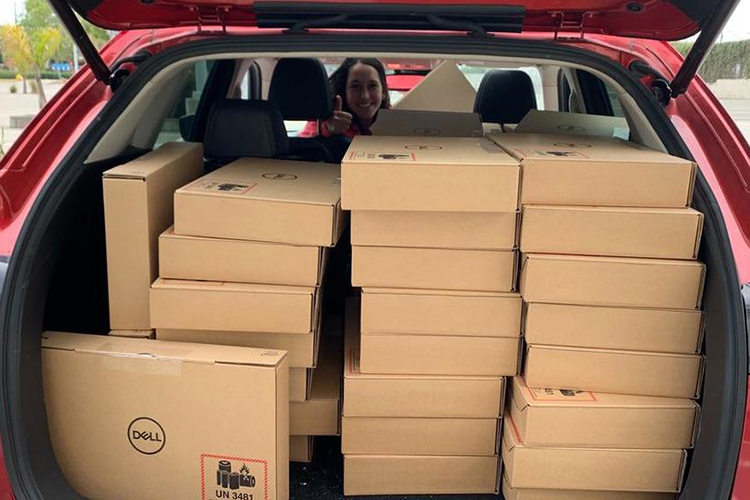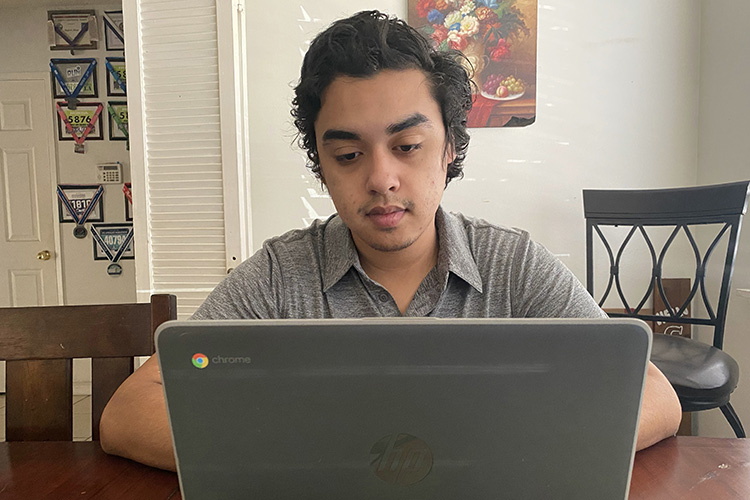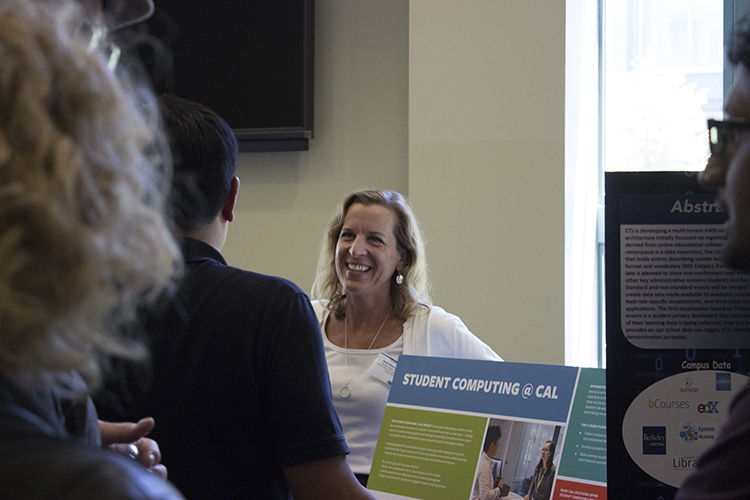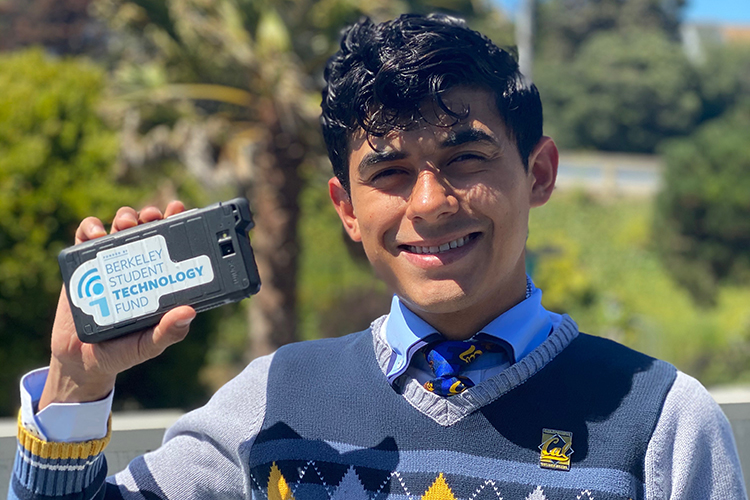
Hundreds of laptops, like these issued last semester to students lacking technology while sheltered in place after courses went online, will be sent to eligible students next month through the campus’s new Student Technology Equity Program (STEP). Jennifer McNulty, analyst for the Student Technology Fund, which is operating STEP, peers over the boxes. (Photo courtesy of Glenn Cruz)
With the fall 2020 semester beginning remotely, a new UC Berkeley program that a campus official calls an example of “Berkeley at its finest,” is providing an extraordinary $4.6 million in support for students who will attend class, do assignments and take tests from home — but who lack reliable laptops, Wi-Fi and other technology.
Some 3,300 laptops and 800 Wi-Fi hot spots will be among the loaner equipment sent, starting in August, to applicants who meet the requirements of the new Student Technology Equity Program (STEP). The program is sponsored by Berkeley’s Office of the Vice Chancellor for Undergraduate Education and the Office of the Chief Information Officer, which together gave $4.1 million to the effort, and is run by the Student Technology Fund, contributor of an additional $500,000.
The program will benefit students like Anthony Meza, who struggled, after instruction went remote in March, without the technology he needed for school. Living with family in Los Angeles, he had no computer, intermittent Wi-Fi and only an old phone “that made Zoom calls and doing homework very troublesome for me,” he said.
“I emailed professors saying I didn’t intend to leave class early, asking them to reopen online exams that would halt halfway, with the horrible connection I had at home,” said Meza, who is majoring in both political science and legal studies.
The COVID-19 pandemic and Berkeley’s quick pivot this spring to online instruction “highlighted the fact that not all Berkeley students have adequate technology to support a remote educational experience,” said Anne Marie Richard, the campus’s associate chief information officer. “Many people assume that all students — including student instructors — carry around the latest and greatest technology. But many rely on library checkout programs, share devices or have old laptops and phones that can’t keep up with their current teaching and learning needs.”

Undergraduate Anthony Meza received a loaner laptop from campus this spring that helped him do schoolwork while sheltered in place in Los Angeles. On campus, he said he often relies on the library’s computers and the option of borrowing a library laptop. (Photo courtesy of Anthony Meza)
Berkeley has been aware of this digital divide for some time, she added, and has offered laptop loaner programs, computer labs, campus Wi-Fi and free and low-cost checkouts for iClicker, a remote device that helps instructors collect instant feedback from students. But for these, students were required to be on campus.
“Once the shelter-in-place mandate was instituted, many students felt the impact immediately,” said Richard, who also is director of information technologies for the Division of Student Affairs. “We knew we needed to do something, and this funding underscores the depth of our commitment to support students.”
“Access to technology,” said Executive Vice Chancellor and Provost Paul Alivisatos, “is part of access to learning, discovery and public service for our students.” For a few years, he’s collaborated with students, staff and faculty to formulate a means-based plan to assist students who can’t afford laptops that met their academic needs. Unfortunately, he said, a drop in state funding prevented the launch of such a program.
Then, in April, anticipating the raging virus’s possible effect on in-person instruction this fall, a proposal for a series of campus investments to improve the remote student learning experience was put together, with STEP as the cornerstone, he said. He added that it was greatly aided by a student-led effort two years earlier that provided data on their peers’ technology needs.
“This is Berkeley at its finest, … equity of experience was on all of our minds from the start,” said Alivisatos, also thanking donors to Berkeley “who have made significant investments to help us through this period when our costs are up, but our income is down.”

Many students now attending Berkeley remotely lack laptops and Wi-Fi at home, having relied on using technology in campus libraries and labs, said Anne Marie Richard, Berkeley’s associate chief information officer. The new STEP program, she said, “underscores the depth of our commitment to support students.” (Photo courtesy of April Irwin)
Meza, who will be a sophomore this fall, benefited from a prior emergency stop-gap program — the Technology Access Program (TAP) — run just during spring semester through the student-funded Student Technology Fund. It provided 470 laptops and 200 hot spots to students who qualified.
“I received a Chromebook that transformed my school experience,” said Meza. “I can work without difficulty, and with grace, now.”
That laptop is helping him this summer, too, in his role as a mentor for incoming Berkeley freshmen in the campus’s six-week Summer Bridge program, which helps give new students a solid start to their journeys at a rigorous research university.
Jennifer McNulty, the Student Technology Fund’s analyst, called STEP “great news,” since TAP did have “limited resources, given the scope of the problem. We were flying by the seat of our pants, trying to get students devices as quickly as we could. We had 1,200 applications for technology, but we were unable to meet the need with the resources we had.”
“Now,” she said, “we can be even more helpful the second time around.”

Samantha “Sam” Good, a fourth-year civil and environmental engineering major who lives in Berkeley Student Cooperative housing, took this photo of herself with her HP Chromebook, which she received earlier this year from the Student Technology Fund. When instruction went remote, she had no computer, having used the Davis Hall computer lab to do her work. (Photo courtesy of Sam Good)
Rodrigo Ramirez, a junior taking Berkeley courses at home this summer in Los Angeles, was a TAP beneficiary. He said he’s grateful for the Wi-Fi hot spot he received, since he does his schoolwork either in his car or at a park, instead of at home in his family’s five-person household.
“It’s too loud” working at home, said Ramirez, who is majoring in two fields — political science and philosophy, “and I need a clear separation between my living space and my work space, mainly for my mental health. The hot spot has helped me greatly.”
The Student Technology Fund was created in 2014 by a $51-per-semester fee that students voted to impose on themselves through spring 2021. It provides grants to fund technology tools and services for Berkeley students who need them. With TAP now retired, the fund moved on to operate STEP — from marketing the program to purchasing equipment to managing distribution through FedEx.
So far, STEP has gotten more than 2,000 applications from students, said McNulty. About 62% are from undergraduates, the rest from graduate and professional students. Many students are from low-income families and on financial aid, she said, and more than 20% reported economic hardship related to COVID-19 that included job loss and caring for family members who are without work, or ill.
Eligibility for STEP is based on verified financial need, and particular attention is given to applicants with instructional duties as undergraduate or graduate student instructors. The program, not open to Summer Sessions students, will continue to distribute hardware on an ongoing basis through the upcoming 2020-2021 academic year, while supplies last.

Undergraduate Omar Rincon received a loaner Wi-Fi hot spot with a paid data plan from the Student Technology Fund’s TAP this spring that took away his worries about exceeding the limits of his own 12 GB plan and stretching his already-tight college budget. Until the campus closed during the pandemic, “I did not realize,” he said, “how much I was relying on the school infrastructure (for free Wi-Fi) … This program allowed me to focus on school without worrying about my consumption of data” for coursework. (Photo courtesy of Omar Rincon)
Even students with need who are not on financial aid can apply, said McNulty, because the application includes a section to self-report economic hardship that may not have existed in their lives before the pandemic.
“Among applicants so far, 23% were dependents of income earners who lost their jobs because of COVID-19, 20% had lost a job or were laid off or had child care obligations that were causing them to earn less and 8% reported additional duties taking care of others,” she said, calling the need exposed by COVID-19 “a total crisis.”
“This connects to what the chancellor’s been saying about Cal unintentionally becoming a commuter campus because of the high cost of (Bay Area) housing,” said McNulty. “Students don’t just come to campus for community, but also for the services. They don’t have internet at home, and they’re working many hours a day in the campus library, because it has resources they don’t have access to. Now, there’s been an artery cut off because the campus is closed.”
McNulty said she and others on campus also are working quickly to try and address the technology needs of 96 students with disabilities who applied to STEP, and they are sending out follow-up surveys to determine the nature of these individuals’ accessibility needs.
Any low-income student in need of a laptop, a hot spot or related equipment, such as a webcam or headphones, said McNulty, should apply to STEP for technology as soon as possible.
Tech support for students is provided by STEP Monday through Friday, from 9 a.m. to 5 p.m., and a STEP FAQs page provides additional information.

Boxes of Sonim XP8 hot spots were readied for distribution this spring at Unit 2 by the Student Technology Fund. Many more will be sent out next month to students who will be learning remotely at the start of fall semester. (Photo courtesy of Jennifer McNulty)
With the Student Technology Fund ending this calendar year, it’s a “multimillion-dollar question” if it will be renewed in a future student referendum, said Richard. The fund also supports the Student Tech Helpdesk; student licenses for heavily-used software, such as Microsoft, Adobe Creative Cloud, MATLAB, LinkedIn Learning and Zoom; and numerous student-initiated technology projects.
“We certainly hope students do vote to renew the program, because it supports crucial elements of their educational experience,” she said. “And we are looking into ways to continue to support student technology needs beyond the 2020-21 academic year, because we are well aware that the need will remain.”
Alivisatos said that campus leaders hope for a way “to continue STEP on a permanent basis … to provide means-based financial support for technology access to every student at Cal. I’m glad we could do more for the fall, but the longer term need is also acute.”
“It sure would help if the State of California could find a way to renew its storied and impactful investment in public higher education,” he added. “The return to the public good of California would be incalculable.”
"need" - Google News
July 21, 2020 at 02:00PM
https://ift.tt/39fWXNo
Campus, going remote, provides $4.6 million in tech to students in need - UC Berkeley
"need" - Google News
https://ift.tt/3c23wne
https://ift.tt/2YsHiXz
Bagikan Berita Ini















0 Response to "Campus, going remote, provides $4.6 million in tech to students in need - UC Berkeley"
Post a Comment